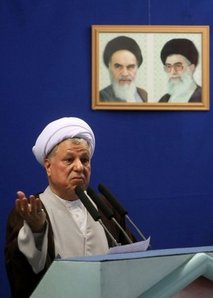The Latest from Iran (18 March): Uranium Distractions
 Thursday, March 18, 2010 at 16:44
Thursday, March 18, 2010 at 16:44  2225 GMT: Rafsanjani Watch. This could be interesting --- Hossein Marashi, cousin of Hashemi Rafsanjani's wife and a Vice Secretary-General of the Kargozaran Party. has been arrested.
2225 GMT: Rafsanjani Watch. This could be interesting --- Hossein Marashi, cousin of Hashemi Rafsanjani's wife and a Vice Secretary-General of the Kargozaran Party. has been arrested.2220 GMT: Edward Yeranian of the Voice of America offers an analysis, "Iranian Government Releases Prisoners for Persian New Year", with contributions from EA staff.
NEW Latest Iran Video: Mousavi's and Rahnavard's New Year Messages (18 March)
NEW Iran: Reading Mousavi & Karroubi “The Fight Will Continue” (Shahryar)
NEW Iran & the US: The Missed Nuclear Deal (Slavin)
Iran Labour Front: Minimum Wage, “Unprecedent Poverty and Hunger”, and Strikes
Iran Analysis: What Does the Fire Festival Mean?
Latest Iran Video: Two Views of the Fire Festival (16 March)
UPDATED Iran Document: Mousavi Speech on “Patience and Perseverance” (15 March)
The Latest from Iran (18 March): Uranium Distractions
2215 GMT: Political Prisoner Watch. Women's rights activist Somaiyeh Farid was arrested on Wednesday. Farid was at Evin Prison enquiring about her husband, Hojat (Siavash) Montazeri, who was arrested on 5 March.
2145 GMT: A Ray of Light. Amidst some poor analyses today of the Iranian political situation and the Green Movement, Melody Moezzi comes to the rescue with this piece in The Huffington Post:
The arrests before Revolution Day last month (11 February) surely dissuaded many opposition protesters not already in jail from pouring into the streets and risking beatings and unlawful detentions. I personally know of several opposition activists who stayed home as a result of the intimidation, and I can't say that I blame them. Still, no matter how few or many pro-democracy demonstrators show up in the streets for Nowruz the Iranian opposition has far from died. Rather, it has merely been pushed underground, but it is germinating like a stubborn hyacinth, taking on a course and a life of its own, teeming with the sweet smell of a freedom to come.
2100 GMT: A slow evening. Only significant news that we've noted is the release of Abolhasan Darolshafaei from detention. He is the last member of the family to be freed, following the releases of daughters Banafsheh and Jamileh and nephew Yashar.
No members of the Darolshafaei family are any longer in custody, just in time for New Year festivities.
1625 GMT: We have posted the New Year's video greetings of Mir Hossein Mousavi and his wife, Zahra Rahnavard, to the Iranian people.
1440 GMT: Political Prisoner Watch. Journalist Bahman Amoui, who has been detained since 20 June (read the letter to him from his wife, Zhila Baniyaghoub), has reportedly been released.
1415 GMT: Political Prisoner Watch: Journalist Akbar Montajabi has been released on bail. So have journalist Keyvan Samimi and Hojatoleslam Mir Ahmadizadeh.
1410 GMT: The Case for Change. Hassan Rowhani, a member of the Expediency Council and ally of Hashemi Rafsanjani, has used a long interview to discuss nuclear issues and to make the case for electoral reforms.
1355 GMT: Escape. The BBC is now reporting the story, which we carried last week, of student activist Ali Kantouri, who has fled Iran after being given a 15-year prison sentence for abduction and extortion.
1340 GMT: We have posted a special analysis by Mr Verde of the political significance of this week's Chahrshanbeh Suri (Fire Festival).
1220 GMT: On the Economic Front. Following up on our Wednesday special on the minimum wage and "unprecedented poverty and hunger"....
Six independent labor organizations have argued that the poverty line is $900 per month and asked for that to be new minimum wage. (The Government has authorised $303.) Economists at Mehr News Agency” have set the poverty line in the coming year at above $1000.
(Persian readers may also be interested in Faribors Raisdana's detailed analysis of minimum wages and labourer's poverty.)
1000 GMT: We have two specials for you this morning (and there's a third on the way). We've posted an excellent account by Barbara Slavin of the US-Iran deal on uranium enrichment that almost came off but then collapsed last autumn, and we have Josh Shahryar's analysis of the latest moves by Mir Hossein Mousavi and Mehdi Karroubi.
0855 GMT: We're Taking Our Subsidy Bill and Going Home. The ongoing fight between the President and Parliament for control of the budget and expenditure is highlighted by a bad-tempered interview of Ahmadinejad supporter Ruhollah Hosseinian in Khabar Online.
Hosseinian declares that, since the Majlis only gave the President $20 billion of the $40 billion he wanted from subsidy reductions, Ahmadinejad should withdraw the proposal: "It's not clear which portion of the government's revenue will be channeled to other sectors by the Parliament, so I believe implementing subsidy reform bill is against our interests."
Asked how the Administration could avoid implementing a plan which has been passed by Parliament, Hosseinian replied:
Although the bill has become a law, a way must be explored to halt its execution, since enforcing this law in its current form will simply add to the problems. As the Supreme Leader of the Islamic Revolution, Ayatollah Ali Khamenei coordinates the interactions between state branches of the country, a method must be found to annul implementing subsidy reform bill.
0830 GMT: The Uranium Issue. An EA reader asks for clarification on the claim that Iran may be facing a crisis over uranium stock for its medical research reactor.
I am strongly influenced by the knowledge that Iran's approach to the International Atomic Energy Agency last June, which set off this round of talks over uranium enrichment, was prompted by the specific issue of isotopes for medical treatment. I have my suspicions, though no firm evidence, that the renewal of a Tehran push for a deal may also be prompted by this immediate need for 20 percent enriched uranium.
We will soon be posting an excellent investigative piece by Barbara Slavin highlighting this issue.
0605 GMT: Political Prisoner Watch. Amnesty International is featuring the case of student activist Milad Asadi, detained without charge since 1 December.
0555 GMT: We might have been concerned with the Fire Festival and the renewed protest through the statements of prominent opposition figures (Mousavi, Karroubi, Khatami), parties (Mojahedin of Islamic Revolution), and activist groups (Committee of Human Rights Reporters).
Looks like the Ahmadinejad Government wants to talk uranium, however. Iran's atomic energy agency chief, Ali Akhbar Salehi, put out the line that it was time to agree a uranium swap inside Iran. First Vice President Mohammad Reza Rahimi insisted, "During the new year, new nuclear plants will be built and the Islamic Republic of Iran will continue with its path without allowing the arrogant powers to meddle."
But, with the US threatening more sanctions and no sign that the "West" will accept a deal where the swap occurs inside Iran, where is the hope for Tehran? No problem: "Russian Deputy Foreign Minister Alexei Borodavkin has called for stronger ties...and urged closer cooperation between Iran and Russia to confront existing regional and international threats."
Better hope so. I get the sense that not only is Iran concerned about economic restrictions, primarily through the withdrawal of foreign companies and investment, but also that there may be a crisis looming over uranium for the medical research reactor.
 Abolhasan Darolshafaei,
Abolhasan Darolshafaei,  Akbar Montajabi,
Akbar Montajabi,  Alexei Borodavkin,
Alexei Borodavkin,  Ali Akhbar Salehi,
Ali Akhbar Salehi,  Ali Kantouri,
Ali Kantouri,  Ali Kanturi,
Ali Kanturi,  Amnesty International,
Amnesty International,  Ayatollah Ali Khamenei,
Ayatollah Ali Khamenei,  BBC,
BBC,  Bahman Ahmadi Amoui,
Bahman Ahmadi Amoui,  Bahman Amoui,
Bahman Amoui,  Barbara Slavin,
Barbara Slavin,  Committee of Human Rights Reporters,
Committee of Human Rights Reporters,  Edward Yeranian,
Edward Yeranian,  Faribors Raisdana,
Faribors Raisdana,  Hashemi Rafsanjani,
Hashemi Rafsanjani,  Hassan Rowhani,
Hassan Rowhani,  Hojat Montazeri,
Hojat Montazeri,  Hojatoleslam Mir Ahmadizadeh,
Hojatoleslam Mir Ahmadizadeh,  Hojatoleslam Ruhollah Hosseinian,
Hojatoleslam Ruhollah Hosseinian,  Hossein Mar'ashi,
Hossein Mar'ashi,  International Atomic Energy Agency,
International Atomic Energy Agency,  Iran,
Iran,  Iran Elections 2009,
Iran Elections 2009,  Josh Shahryar,
Josh Shahryar,  Kalemeh,
Kalemeh,  Kargozaran Party,
Kargozaran Party,  Keyvan Samimi,
Keyvan Samimi,  Khabar Online,
Khabar Online,  Mehdi Karroubi,
Mehdi Karroubi,  Melody Moezzi,
Melody Moezzi,  Milan Asadi,
Milan Asadi,  Mir Hossein Mousavi,
Mir Hossein Mousavi,  Mohammad Khatami,
Mohammad Khatami,  Mojahedin of Islamic Revolution,
Mojahedin of Islamic Revolution,  Russia,
Russia,  Somaiyeh Farid,
Somaiyeh Farid,  The Huffington Post,
The Huffington Post,  Voice of America,
Voice of America,  Zahra Rahnavard,
Zahra Rahnavard,  Zhila Baniyaghoub,
Zhila Baniyaghoub,  uranium enrichment in
uranium enrichment in  Middle East & Iran
Middle East & Iran 




